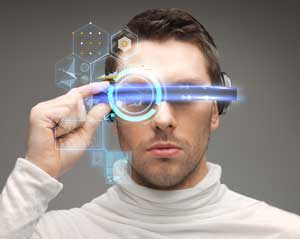
The Internet is just a few decades old, but in that short span of time it has experienced significant changes. It grew out of a mass of independent networks into a global entity. It serves as a connecting platform for various aspects of our lives ranging from business, communication, entertainment and education. And you can connect to this enormous network through dozens of different devices.
The computer technology landscape is on the verge of changes that will transport us to places few people have imagined. We know that computers will be immensely more powerful, mobile, and connected. The question for the next 20 years is whether we'll be able to tell where technology ends and the rest of our life begin.Technology will become unavoidably entrenched in advanced devices that deliver information and entertainment to our homes and our hip pockets, in sensors that monitor our environment from within the walls and floors of our homes, and in chips that deliver medicine and augment reality inside our bodies.
Scientists’ postulates that inside the subsequent twenty years there won’t be anything referred to as a laptop; instead we’ll have a mass of gadgets. A number of those gadgets could be as minute as a pack of playing cards or maybe a wristwatch, making them hold to hold about. Finally, they'll be even sufficiently small enough to be embedded in our clothes or possibly even under our skin.
Connected to the ‘Internet’, most of these devices can be capable to locate information and proportion it amongst different gadgets. And in place of needing a keyboard or maybe a pen for giving commands and statistics, these devices will reply to our voice or maybe a face gesture, or maybe get to know our choices, and act earlier before we even tell them to do what.
Some Predictions for Internet and the Computer in the next 20 years
- Information sharing over the Internet will be so easily woven into our daily life that it will become unseen, flowing like electricity, mostly through machine intermediaries.
- Electronic gadgets will progressively have their own patterns of communication, which they use to share and collate algorithms. The spread of the net will enhance global connectivity that fosters greater global relationships and much less ignorance of others.
- Augmented reality and wearable gadgets can be applied to reveal and deliver brief comments on each day life, mainly tied to non-public health.
- We will grow accustomed to seeing the world through multiple data layers. This will alter a lot of social practices, such as dating, job interviewing and professional networks, and gaming, as well as government policing and intelligence.
- The spread of the ‘Internet’ will weaken the strength of borders, and new ‘countries’ over the web would arise which will be out of the control of current nation states. David Hughes, an Internet pioneer, predicted that, “All 7-plus billion humans on this planet will sooner or later be ‘connected’ to each other and fixed destinations, via the Uber (not Inter)net. That can lead to the diminished power over people’s lives within nations. When every person on this planet can reach out, and communicate two-way, with every other person on this planet, the power of governments of nations to control every human inside its geographic boundaries may start to diminish.”
- Speak and It Will Hear: The next generation of electronic chips will give future PC’s even greater abilities, making interaction with them easier and more personal, says Wilf Pinfold, director of the microprocessor research lab at Intel. For example, Pinford says it wouldn’t be too surprising to one day see a computer that reacts to our speech. The conventional speech-recognition programs that we have these days just key in on our voice, but future programs would watch our lips. Such that “Speech interfaces can be trained that when I’m facing the computer, it knows I am dictating to it,” says Pinford. “But if I turn away, it will stop.”
- Indeed, as further developments are made in interactive software and powerful chips, these next devices could become quite “personal.” For example, buying a yellow sweater on the internet these days requires hours of going from website to website. But Intel’s Pinford says that the next generation computing devices— and the networks they are connected to — will learn from our past shopping experiences and simplify the buying process. So finding that perfect sweater of our choice may simply be done by showing a picture of a sweater to the computer and instructing it go find it.
This shiny happy future will come at a cost, though in terms of security and privacy concerns. So let's hope that our jetpacks come with seat belts, because it's definitely going to be a wild ride!

